9 Best Flooring Nailers of 2020 – Reviews & Buying Guide
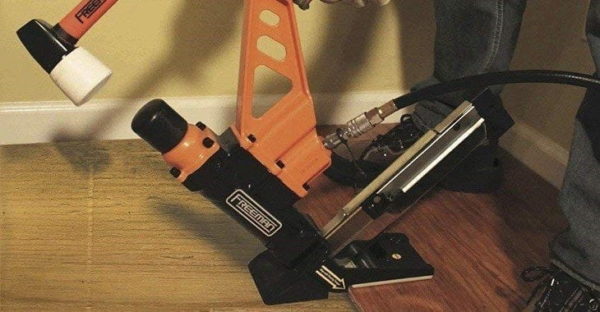
If you are planning to do some home improvement that will involve installing new hardwood floors or repairing what you have, you need to have a good flooring nailer by your side.
While it is possible to nail the wood pieces by hand, and people have been doing it for many years, this is always a tedious and time-consuming process and the results might not be very pleasing.
A flooring nailer not only makes the job easier but also ensures that the nails are inserted in the correct angle (at precisely a 45 degrees) to ensure you never have to worry about wrong placement.
These nailers are available in both manual and pneumatic models, and each has some merits and demerits. But, apart from deciding on the type to buy, there are still many other things you need to know about these handy nailers.
In this guide, we highlight some of these vital things that every homeowners or contractor that intends to buy a flooring nailer should know, and also review the 10 best flooring nailers.
Image | Product Name | PSI | Weight | Rating | Current Price |
|---|---|---|---|---|---|
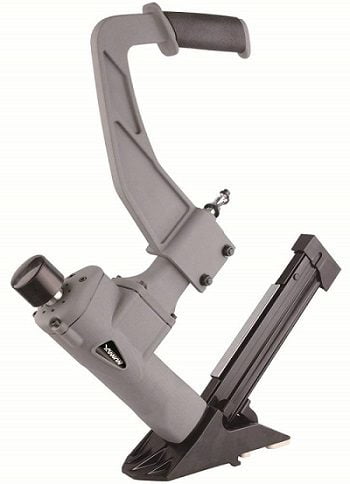 | 1. NuMax SFL618 3-in-1 Pneumatic Flooring Nailer / Stapler | 70-115 | 16.0 lbs | 4.6 | |
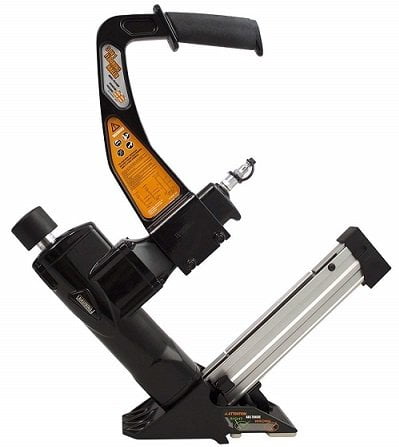 | 2. Freeman PFL618BR 3-in-1 Pneumatic Flooring Nailer | 70-110 | 10.76 lbs | 4.6 | |
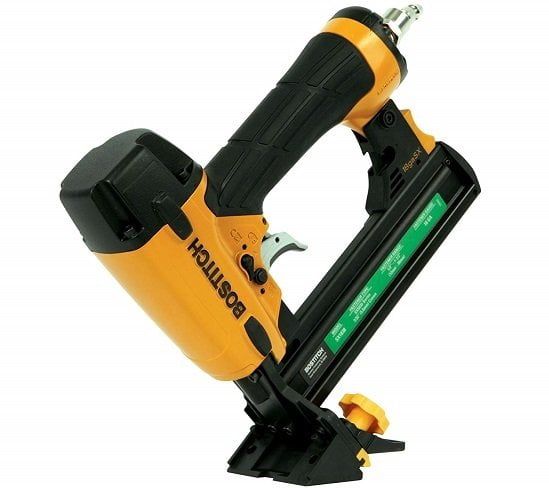 | 3. Bostitch EHF1838K Hardwood Flooring Nailer | 70-120 | 3.47 lbs | 4.3 | |
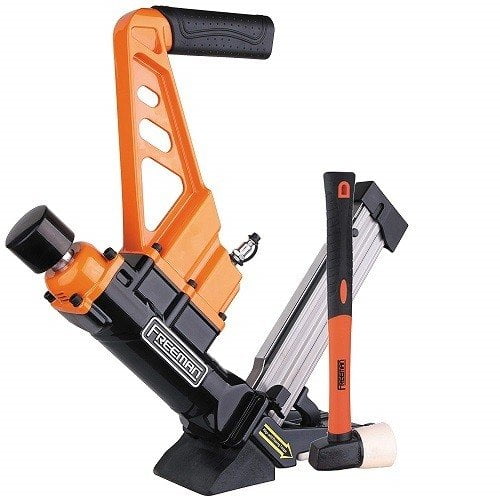 | 4. Freeman PDC50C 3-in-1 Flooring Nailer/Stapler | 70-115 | 9.5 lbs | 4.3 | |
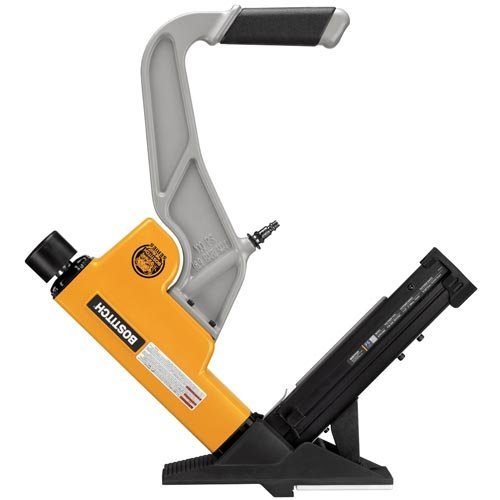 | 5. Bostitch BTFP12569 2-in-1 Flooring Nailer | 70-100 | 10.20 lbs | 4.2 | |
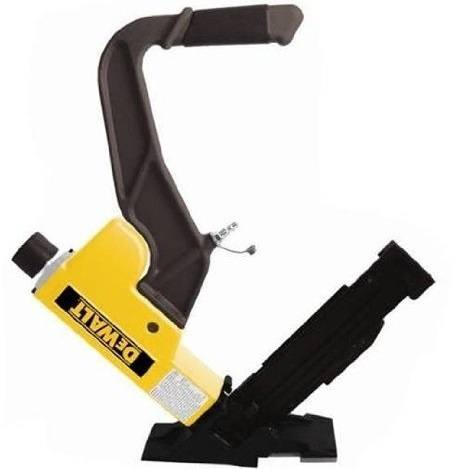 | 6. DeWalt DWFP12569 Flooring Nailer | 70-100 | 10.6 lbs | 4.6 | |
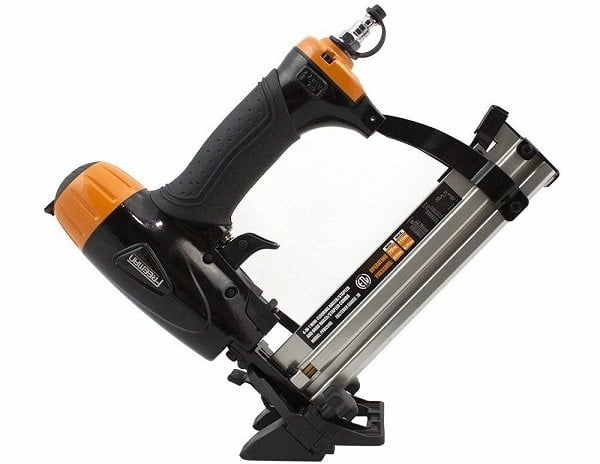 | 7. Freeman PFBC940 4-in-1 Flooring Nailer | 70-115 | 4.0 lbs | 4.1 | |
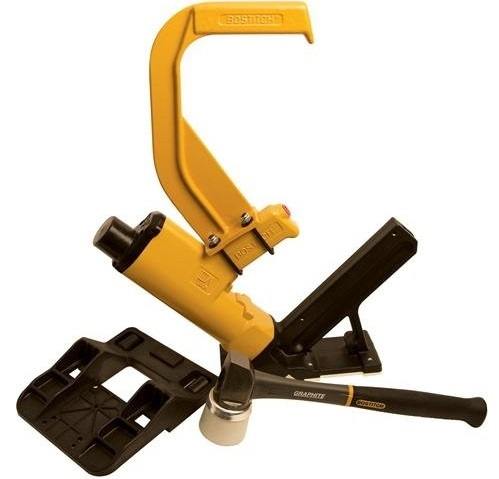 | 8. Bostitch MIIIFN Pneumatic Flooring Nailer | 70-120 | 11.2 lbs | 4.5 | |
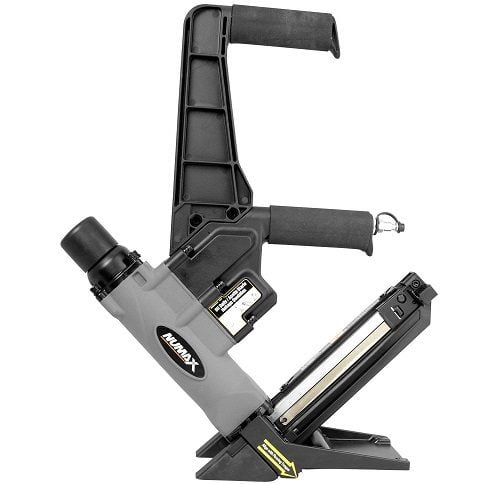 | 9. NuMax S50LSDH Dual Handle Flooring Nailer | 70-115 | 7.27 lbs | 4.4 |
You can also read other nail gun reviews such as framing nailer, finish nailer, brad nailer, roofing nailer, pin nailer, siding nailer, palm nailer.
9 Best Flooring Nailers
Whether you are installing a new hardwood floor or upgrading an old one, there are plenty of flooring nailers out there to help with the job. But, in our table below we compare 10 of the top-rated ones using factors like power source, PSI, and weight.
#1. NuMax SFL618 3-in-1 Pneumatic Flooring Nailer/ Stapler
Editor's Rating:  (4.6 / 5)
(4.6 / 5)

- Power Source: Pneumatic
- PSI: 70-115
- Weight: 16 lbs
The flooring nailer comes with interchangeable base plates, and you can choose to use either the 1/2 or 3/4-inch plate depending on the thickness of your flooring planks.
It operates at between 70 and 115 PSI which makes it ideal for installing both thin and dense wood floors. And it has a high capacity cleat magazine that can accommodate up to 120 nails to reduce downtimes.
NuMax uses a tough and lightweight die-cast aluminum to make this nailer, and this means that it is not only durable but also easy to move around and balance when nailing.
Other things like the extended handle (23-inch tall), anti-dust cap, non-mar rubber mallet and the 1/4-inch NPT fitting that ensures you can use most air compressor also help to make this a top-notch flooring nailer.
Pros:
Cons:
#2. Freeman PFL618BR 3-in-1 Pneumatic Flooring Nailer
Editor's Rating:  (4.6 / 5)
(4.6 / 5)

- Power Source: Pneumatic
- PSI: 70-110
- Weight: 10.76 lbs
Besides the durable body, this top-rated flooring nailer is also quite versatile as it will fire staples and both T and L cleats. And it has interchangeable base plates (1/2 and 3/4 inch) to make it ideal for installing different flooring thicknesses.
This nailer runs at between 70 and 110 PSI, and it also comes with a high-capacity magazine that will accommodate between 100 and 120 cleats/staples.
It is also quite a comfortable tool to operate thanks to the convenient long reach handle and padded grip.
The flooring nailer will come with a durable carrying case, and with other vital things that you need such as no-mar rubber mallet, goggles, wrenches, and oil. And the manufacturer backs it with an impressive 7-year limited warranty.
Pros:
Cons:
#3. Bostitch EHF1838K Hardwood Flooring Nailer
Editor's Rating:  (4.3 / 5)
(4.3 / 5)

- Power Source: Pneumatic
- PSI: 70-120
- Weight: 3.47 lbs
It is a hardwood flooring nailer that is designed for maximum convenience and to speed up your flooring projects.
This lightweight flooring nailer uses an easy-sight tongue guide that will make it super easy to install bamboo and hardwood flooring as it will help you drive staples into the pocket correctly every time.
Additionally, you will also never have to worry about scratching your delicate floors as it comes with a non-mar cap. And the oil-free operation eliminates the risk of staining the wood.
Also, it is designed to work with almost any floor size as it comes with adjustable knobs for tool-less adjustment when working on varying thickness flooring.
Operating it is also quite comfortable thanks to the soft rubber grip on the handle and the muffled rear exhaust that directs the air away from the user. This flooring nailer will come with a 7-year limited warranty.
Pros:
Cons:
#4. Freeman PDC50C 3-in-1 Flooring Nailer/Stapler
Editor's Rating:  (4.3 / 5)
(4.3 / 5)

- Power Source: Pneumatic
- PSI: 70-115
- Weight: 9.5 lbs
This 3-in-1 nailer will shoot both cleats (both T and L) and staples to make it very useful for various wood flooring projects.
It uses 16-gauge T and L-cleats and 15.5-gauge staples, and it will operate at a pressure of between 70 and 115 PSI. The nailer also comes with interchangeable base plates that will let you choose between 1/2 and 3/4-inch plate options depending on the wood thickness.
Like with most other high-quality flooring nailers, you will not have to worry about scratching the floor or material as it is equipped with a non-marring foot
This nailer will also come with a fiberglass mallet, and the manufacturer backs it with a 7-year limited warranty.
Pros:
Cons:
#5. Bostitch BTFP12569 2-in-1 Flooring Nailer
Editor's Rating:  (4.2 / 5)
(4.2 / 5)

- Power Source: Pneumatic
- PSI: 70-100
- Weight: 10.20 lbs
Bostitch makes some of the best hardwood flooring nailers in the market and their BTFP12569 2-in-1 model is a perfect example of one such tool.
It is also suitable for engineered flooring and it comes with interchangeable and non-marring base plates. These base plates help prevent scratches on the material and also make it possible to work with various flooring thicknesses.
This nailer will shoot both stapes and L-shaped cleats and it is an ergonomically designed tool with a long handle and comfortable rubber grip for maximum comfort, and to minimize fatigue when using it for long.
Bostitch BTFP12569 will operate at a pressure of between 70 and 100 PSI and it is backed by a 7-year limited warranty.
Pros:
Cons:
#6. DeWalt DWFP12569 Flooring Nailer
Editor's Rating:  (4.6 / 5)
(4.6 / 5)

- Power Source: Pneumatic
- PSI: 70-100
- Weight: 10.6 lbs
You can trust DeWalt to have a good flooring nailer for your projects as they are a highly reputable company that is famous for making top-notch quality power tools.
Their DWFP12569 pneumatic flooring nailer is one of the priciest items on our list. But like with most other tools you always get what you pay for, and so you can be confident that it is worth the price.
It has relatively lower CFM requirements when compared to other pneumatic nailers and this translates to less air compressor run-time.
And it is optimized to work with the most common and popular nailing fasteners which are the 15.5-gauge staples and the 16-gauge L-shaped cleats.
The ergonomic design which consists of a long handle with a comfortable rubber grip makes it comfortable and easy to use with minimal hand fatigue even when nailing for extended periods.
This flooring nailer uses interchangeable and non-marring base plates that will adjust to any flooring size and thickness.
And it is fitted with the standard 1/4-inch air fitting that makes it ideal for use withalmost any air compressor.
Pros:
Cons:
#7. Freeman PFBC940 4-in-1 Flooring Nailer
Editor's Rating:  (4.1 / 5)
(4.1 / 5)

- Power Source: Pneumatic
- PSI: 70-115
- Weight: 4 lbs
It is the cheapest item on our reviews but it is still a high-performing mini flooring nailer that will never disappoint.
And it is also quite a versatile tool as it not only shoots both staples and nails but will also convert easily into a brad nailer to help with finish woodworking projects. Essentially this means that you will have two tools in one.
This flooring nailer is also the seconds lightest on our list as it only weighs 4 pounds, and this makes it great for extended use.
Jam clearing is easy thanks to the quick release nose, and it also has a reload indicator and allows for tool-free depth adjustment to make it even more convenient.
Pros:
Cons:
#8. Bostitch MIIIFN Pneumatic Flooring Nailer
Editor's Rating:  (4.5 / 5)
(4.5 / 5)

- Power Source: Pneumatic
- PSI: 70-120
- Weight: 11.2 lbs
It delivers up to 420 in/lbs of driving power which is quite massive when compared to others in the same category. And the high-speed pneumatic operation ensures that you can drive nailrs into both unfinished and pre-finished wood planks with impressive speeds.
The flooring nailer has an extra-wide base plate that provides excellent stability and control to not only speed up your work but also for more accurate outcomes.
With the ergonomic design that includes an elongated handle with a rubber grip, this nailer is comfortable to operate and a great choice for extended use.
Everything from the durable aircraft grade aluminum body to the graphite mallet is built for durability. And Bostitch backs it with their amazing 7-year limited warranty to prove this.
Pros:
Cons:
#9. NuMax S50LSDH Dual Handle Flooring Nailer
Editor's Rating:  (4.4 / 5)
(4.4 / 5)

- Power Source: Pneumatic
- PSI: 70-115
- Weight: 7.27 lbs
The flooring nailer comes in a dual handle design where you can use the short handle when nailing from a kneeling position, and the elongated one when standing and do not want to strain the back.
With a high-quality and lightweight aluminum body and rubber O-rings, this is also a highly durable flooring nailer that will serve you well for many years.
Other features that many users will love include the non-mar base foot for protecting the finished surfaces, quick release nose for fast jam clearing, and a light strike bumper for quick and easy operation.
Pros:
Cons:
Flooring Nailer vs. Flooring Stapler
It is common to hear some people use the terms flooring nailer and flooring staplers interchangeably. However, this is due to lack of proper information.
Although the two tools serve quite similar roles they are quite different and each has pros and cons, and this makes them ideal for different situations.
Flooring Nailer
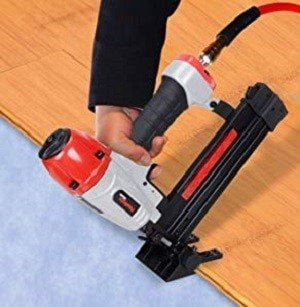
The flooring nailer is the older of the two types as it has been around for close to three decades now. This nailer uses cleat nails for fastening, and it is what many contractors refer to as the flooring cleat nailer.
Flooring nailers are available in both manual and pneumatic types. The manual types require additional muscle because they rely solely on the user’s strength while the pneumatic ones will require you to have an air compressor.
Both types of flooring nailers still require the user to hit the driver head when inserting the nails, and the amount of pressure required depends on the density of the flooring wood.
Flooring Cleat Nails Gauge
Flooring nailers will in most cases use 18 or 16-gauge cleat nails but there are also some 20-gauge cleats available in the market for engineering flooring.
Cleat nails are a much better option for places that tend to experience frequent temperature changes as they allow the wood to expand or contract a lot more freely.
If you are using thicker and harder wood like bamboo or Brazilian cherry and walnut the flooring nailer is the best option as it applies more pressure to keep the wood in place.
Because nails tend to be more expensive than staples, the flooring nailer is generally a more expensive tool to buy and operate than the flooring stapler.
Flooring Stapler
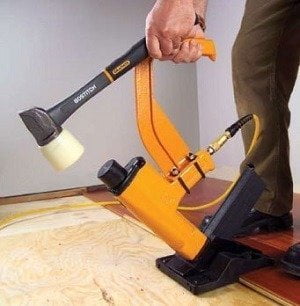
Flooring staples also come in both manual and pneumatic models. But, there are also electric flooring staplers in the market that are gradually becoming more and more common.
As their name suggests, the flooring staplers use staples to fasten wood on the floor. The staples have two prongs that will anchor the flooring wood into the subfloor.
Flooring Staples Gauge
Flooring staples are in most cases 15.5-gauge which means they are larger than the nail cleat used by flooring nailers. Although the initial affixing power of the larger staples is stronger than cleats, they do not do a very good job holding hardwood to the subfloor in the long run.
Also, the shape of the staples and penetration force gives them a tendency to split the tongue of the flooring when working with planks that are less than 3/4-inch thick. And this also means they are also not very good for nailing very brittle wood.
Staples have a simpler design and so they are cheaper to make than cleats, and this makes the floor stapler a more affordable option.
What should you buy?
The choice between the floor stapler and floor nailer will in most cases be based on personal preferences.
However, the flooring nailer is a much better option when dealing with very hard and brittle wood, and also if you live in a place that experiences frequent temperature changes.
Flooring staplers, on the other hand, are ideal for wood that is not very brittle, and also for those that are looking for a more affordable flooring tool with more initial affixing power.
How to Buy the Best Flooring Nailer
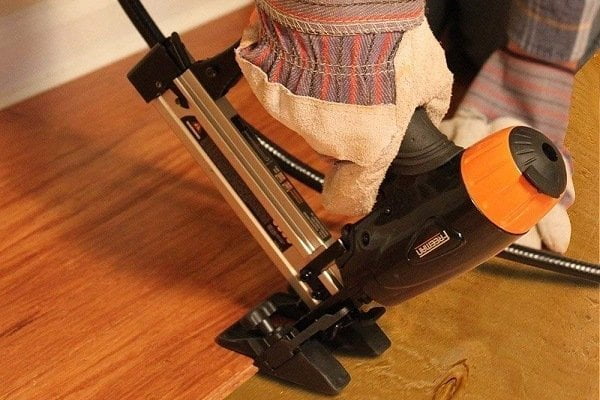
When it comes to choosing a good flooring nailer there is a lot more to consider besides the reputation of the brand.
Your choice of flooring nailer should help you achieve your desired objectives while also giving you value for your money. For this to be so, here are some important points to keep in mind.
#1. Manual vs. Pneumatic Flooring Nailer
The first decision that you need to make when it comes to buying a flooring nailer is whether to go for a manual and pneumatic one.
While both types can still do a good flooring job, each will have some pros and drawbacks which you should know before making up your mind.
Manual Flooring Nailer
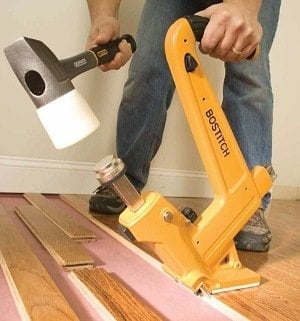
Manual nailers are the mores simplistic types of the two as they do not require an air compressor to drive the nails into the wood.
These nailers will rely purely on muscle power, and so unlike the pneumatic nailers, they will require two hits of the bumper. The first hit is for positioning the cleat and the second one is for actuation.
The simple design and the fact that these nailers do not require an air compressor makes them more affordable to own and operate in the long run.
Pros:
Cons:
Pneumatic Flooring Nailer
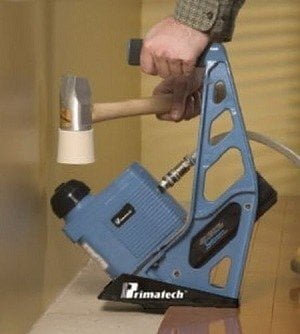
There is no flooring task that is too hard or big with the best pneumatic flooring nailer. And this explains why they are the most popular option among the two types for both DIYers and professional contractors.
Pneumatic nailers are designed to work with an air compressor to drive in the cleats into the flooring planks. Hence, unlike the manual nailers, you only need to hit the bumper once to shoot the nails into the material.
These nailers are much faster than the manual ones and also produce more precise and accurate results which make them the best choice for large-scale flooring projects.
However, the fact that they use an air compressor not only makes them expensive to buy but also more costly to operate and maintain in the long run.
Pros:
Cons:
Buying Advice: If you are looking for a highly accurate, reliable and fast flooring nailer for working on larger floors, the pneumatic nailer is a great buy.For those that are shopping on a tight budget and want something for use on smaller surfaces or for occasional flooring tasks, the manual nailers will work just fine.
#2. 18-Gauge vs. 16-Gauge Flooring Nailer
Using the wrong nails for your flooring project can either ruin the floor by splitting the material or fail to hold it in place well and result in annoying squeaking.
Hence, it is always important to make sure that you choose the right cleat gauge and appropriate nailer to fire them.
In most cases, you will need to choose between the 18 and 16-gauge flooring nailers as they are the two cleat gauges typically used for flooring
18-Gauge Flooring Nailer
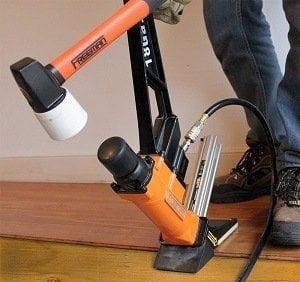
18-gauge flooring nailers are designed to shoot the thinner 18-gauge cleats. These thin nails are more ideal for thinner floors or when using thinner and more delicate flooring planks.
While some 18-gauge flooring nailers can shoot cleats that are strong enough to go through harder flooring planks, they will still not provide sufficient affixing power to keep them in place for long.
16-Gauge Flooring Nailer
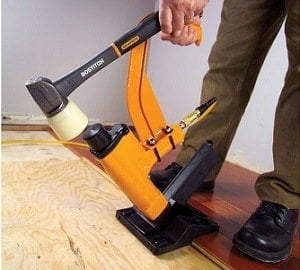
The 16-gauge flooring nailers will shoot the relatively thicker 16-gauge cleat nails which are designed for affixing thicker and harder wood planks as they provide more hold power.
These flooring nailers are what many contractors seem to prefer as they can handle almost any type of flooring job.
Buying Advice: If you are going to use thinner or more brittle material when flooring, choose the 18-gauge flooring nailer. But, if you are a professional contractor looking for something that can handle harder and thicker wood flooring planks, the 16-gauge flooring nailer is your best pick.
#3. Cleats vs. Staples
Another vital decision that you are going to have to make when it comes to choosing the best flooring nailers is whether you prefer to use cleats or staples.
But, there are many modern flooring nailers that use both cleats and staples. And so depending on what you intend to use your flooring nailer for, sometimes it is a great idea to go for the models that use both types of fasteners.
Cleats
Cleats are the more popular option for hardwood flooring as they can handle almost any type of wood. They come in two types which are L-shaped and T-shaped cleats.
Flooring cleats will mostly be made from steel, and they will have a ribbed edge that makes them attach to both the flooring and subflooring firmly. These ribs are also a great advantage as they give the cleats a much better hold of the flooring than staples.
Because cleats tend to be more forgiving or accommodative for the expanding and contracting of the wood, they are a much better option if you dwell in places where the temperature fluctuates drastically.
The most significant downside of cleats is their cost because they can cost up to twice of what you would pay to staples.
Staples
Staples are designed with two long and smooth prongs that will go through the flooring and into the subflooring with ease.
Flooring staples are a little bigger than cleats, and so they tend to provide a much better initial hold. However, staples tend to start loosening over time as a result of the continuous expansion and contraction of wood.
Although staples are much more affordable than cleats, it is important that you first weigh between the price and downsides before deciding to use them.
Buying Advice: For professional contractors, a flooring nailer that uses both cleats and staples is the best choice. But, if you are a DIYer or homeowner looking for something cheap for use on your small-scale flooring projects and do not mind having to redo the floors after a few years, the affordable flooring nailers that shoot staples only can still be okay.
#4. Body Construction
Flooring nailers are by far not the most expensive tools but you do not want to have to buy a new one after every few projects. Hence, it is always important to go for something that is well-built and highly durable.
The build quality or construction of the body is a vital factor to consider. And apart from going for a tough and sturdy material you should also ensure it is still lightweight enough and with a comfortable handle.
Aluminum is the most commonly used material in the manufacture of flooringnailers. It is not only tough and durable but also has the added benefit of being lightweight
#5. Power Source
When it comes to the power source, the two most common options are manual and pneumatic. Manually operated flooring nailers are more affordable but they are tedious to operate and will not be appropriate for large flooring projects.
Pneumatic ones are the most popular and a favorite of both professional contractors and DIYers but they are more expensive to buy and operate as they require an air compressor.
It is also worth noting that there are also electric staplers on the market that can be quite convenient and useful.
#6. Weight
The material that the flooring nailer is made from is one of the key determinants of its weight. But, it is vital to go for a nailer that is lightweight enough to ensure that it is easy to move around and that it will not take a lot of effort to balance.
#7. Price
It is always important to get value for your money and this means that the right flooring nailer for you is one that is not only well-built and high-performing but also affordable.
A flooring nailer that suits all your needs is fast and efficient and comes at a reasonable price tag is always the best option.
However, it is important to note that these tools come in various price ranges as you can get some for under $100 while some high-end brands will retail for close to $500 or even more.
#8. Warranty
You cannot be sure whether the flooring nailer you buy will serve you well and for long before you get to use it. And so it is important to go for something that comes with a good warranty.
Some brands will offer a 1-year warranty while others will offer up to 7-year warranties or even a limited lifetime warranty.
The longer the warranty the better but also remember to check the terms of the warranty and the reputation of the manufacturer in honoring it.
Conclusion
Whatever flooring nailer you choose will always have an immense effect on not only the speed of completing the flooring projects but also the accuracy and quality of the outcome.
Therefore, you cannot afford to go wrong with your choice whether you intend to use it for professional contractor projects or even for your home improvement and renovation project.
By considering factors like the type, power source, body construction and weight, and with our top 10 best framing nailers reviews for recommendations, finding the perfect flooring nailer for all your projects should not be a tedious task.
Last Updated on November 22, 2020 by Tom Bradly
